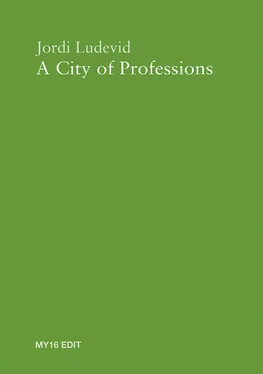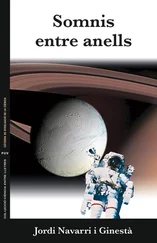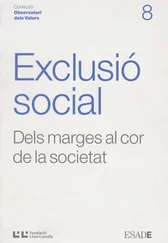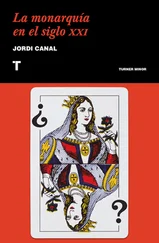At a time when the economy was not industrial but agrarian, the space-time of the guilds was the burg, the medieval city. It was not the nation, or the continent, or the global world. However, following the French Revolution and the suppression of the guilds (1791 in France, 1834 in Spain), in their place, the nation state proclaimed itself the sole guarantor of those rights. And so it has continued to this day.
It is worth noting here that the guilds enacted a threefold self-regulation:17
•Economic self-regulation (guaranteeing members’ economic rights).
•Self-regulation in terms of training and education (guaranteeing the transmission of practical knowledge, workshop ownership, craftsmanship, philo technè, and proper conduct).
•Self-regulation of social protection (social services, aid).
17As we know, self-regulation does not mean every man for himself, but entails a commitment that is aligned with the common interest.
The Modern European University
In modern times, fully immersed in the logic of the nation state and the creation of a single national market (i.e., from the beginning of the 19th century onwards), the so-called Napoleonic university, in the context of the birth of the new European university, explicitly took over the task of training professionals. The name came from the ancient word and custom of professing, sometimes involving a specific ceremony, which signified becoming a member of a group and to devoting themselves to a certain practical knowledge, considered necessary for society based on a decision of the State.
The orientation of the Napoleonic university was one of two basic strategic directions among the nascent modern European universities. Its original objective was practical knowledge: to train the professionals needed by society needed. This stood in contrast to the option proposed by Humboldt in Germany, which was much more oriented towards training scientists and humanists. The Napoleonic schools thus began to grant licences for the legitimate exercise of the professions that had been recognised by society. Thus, the universities offered «certification», with schools staffed by «professors» – professionals who were trained to teach – not necessarily «masters» (the former magistri, dedicated to research and the cultivation of knowledge). New structures, entirely dedicated to study and research, were created for those who wished to devote themselves to scientific research, and only eventually to teaching.
This approach had a very direct impact on the new societies of southern Europe and contributed to solving the new practical problems of a nation state that had become a unified political space populated by citizens with equal rights, decisively influencing the world of the professions and its future in Spain to this day.
Max Weber
Following the beginning of the industrialisation process with the expansion of capitalism, the next significant milestone was set by the German Calvinist sociologist Max Weber (1864-1920). Considered one of the founders of modern sociology, along with Karl Marx and Émile Durkheim, in his classic work The Protestant Ethic and the Spirit of Capitalism, the sociologist and historian defines the term profession [Beruf] as follows: «the continuous activity of man on the basis of the division of labor, which is normally his source of income and thus a permanent economic living.»
This is, of course, a classic definition, which has survived to the present day – i.e., for more than a century. It was formulated at a time when, sociologically, the number of professionals was increasing considerably, and they were playing a new and significant role in the nation state and in the nascent industrial economy required by the new capitalism.
Weber’s definition emphasises two of the basic characteristics of the professions: their individual character and their economic dimension, and it does so within the framework of a defence of the close relationship he postulates between Protestantism and capitalism. The professions are seen as a means of subsistence for a growing number of individuals, which makes them an «individual instrument» for earning money, thus highlighting the autonomy of the subject, an aspect characteristic of the then nascent modernity. Max Weber’s Calvinism sees professional activities as the path to a person’s salvation or damnation. If he succeeds professionally, he is saved; if he fails, he is damned.
However, as some authors point out, today, this approach is limited and even outdated because it ignores the aims and the social activity of the professions, which are no longer elitist. That approach was still coherent in the early 20th century, but it has become totally inadequate at the beginning of the 21st.
Mention should also be made of the work of Émile Durkheim, an important French sociologist who provides a fundamental and complementary link when it comes to interpreting and describing the expansion and social impact of the professions in European countries and their role in social cohesion.
The 21st Century
Civic Ethics
The changes that took place over the course of the second half of the 20th century and the beginning of the 21st are dizzying. Important new circumstances appeared on the horizon. Professional demography exploded and became more feminised, specialised and digitalised. That is no small thing. Moreover, culturally, the public sphere is no longer exclusively political, a fact that has affected the professions and their institutions. And the extraordinary massification of the professions has made it clear that they are no longer dominated by «the old or new elites»; they are no longer «aristocracy», but «democracy».
The spread of knowledge and the process of its specialisation, which were unrelenting during the 20th century, have generated a much larger workforce in the professions and services. The new key elements for all professions include feminisation – with women gaining widespread access, the exacerbation and «triumph of the markets», the global population explosion, the digital transition and the network society, the intense and chaotic urbanisation of the planet, and the global ecological crisis, together with the growing difficulties associated with civic responsibility and citizenship.
Moreover, in parallel, as Emilio Martínez Navarro aptly explains it, today, as a multitude of social activities have acquired the characteristics of a profession, the old distinction between professions and trades has been blurring and losing its meaning. The term profession now designates virtually any occupation or task, and there has been a progressive loss of the traditional privileges associated with some professions. At the same time, certain trades are demanding to be considered professions. This process of loss of privileges and progressive equalisation in the consideration of social activities is fully consistent with the principles of the liberal revolutions, which put an end to the regimes of absolute monarchy. In modern societies, all citizens have the same fundamental rights and obligations, and it is therefore unacceptable for certain groups to enjoy privileges that others cannot access.18
It is in this completely new context that the philosopher and professor of philosophy Adela Cortina19 offers four contemporary clarifications on Max Weber’s now dated definition:
1. A profession is not only a «source of income», i.e., a subjective end; rather, the profession has a purpose in itself, the achievement of which is what gives it meaning and social legitimacy. In consequence, society can require its fulfilment and demand its quality.
2. A profession, in addition to being an individual activity, is a collective activity, uniting a professional community that has shared goals and uses a common language, with similar methods and its own ethos. In other words, just as there is a personal ethos (‘character, way of being’), there is also a professional ethos of the profession. Architects know a thing or two about this...
Читать дальше












